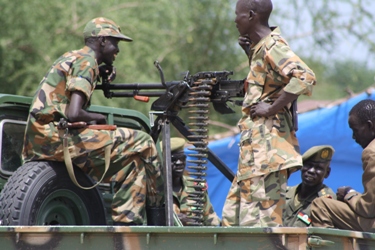10 security personnel killed in South Sudan’s Lakes state
June 5, 2015 (RUMBEK) – At least 6 policemen and 4 soldiers from the South Sudanese army (SPLA) were killed on Thursday when fighting erupted between armed youth and security forces in Akot payam of Rumbek East county in the war-ravaged Lakes state, located in the center of South Sudan.

A top officer in Rumbek central police at the Criminal Investigation Department (CID) confirmed to Sudan Tribune the initial death toll with fears that the number of the dead could rise as tensions were still simmering. He said the soldiers were killed in a military barrack when it came under attack by pastoralist youth group hostile against the government.
An eyewitness in Rumbek said he also saw SPLA forces being dispatched to Rumbek East county, the scene of the clashes, with fears that the fighting would resume any time soon between government troops and pastoralists.
Claims by rebels allied to former vice-president, Riek Machar, under the overall command of Brigadier General Khamis Abdel Latif, that they were responsible for the fighting in the area were however rubbished as false by the government.
State minister of information and communication, Dhiel Wal Takping, said the state government had sent it forces to contain the rising insecurity which rebels could take advantage of and turn into a rebellion against the state government loyal to president Salva Kiir.
“We have sent in forces to control that situation- the civil populations are going about their normal life but government will deal with robbers along roads – the common ambushes will be countered by our forces,” Takping told Sudan Tribune.
He explained that the clashes between government’s forces and Akot payam pastoralist youth group erupted when a pastoralist was killed by SPLA forces.
“The pastoralist was found looting passengers between Atiaba and Akot jungle, so that SPLA car was passing and immediately SPLA got him looting passengers. So the pastoralist was ordered to lay down his firearm but the pastoralist opened fire on SPLA car wounding one soldier. So immediately the SPLA soldiers shot him dead as part of self-defence,” he said.
However, activists rubbished minister’s statement terming it as propaganda. Moses Ater who visited the scene said that government forces were imposing aggressive attitude over the pastoralist youths. He accused forces of imposing to disarm pastoralists while the state is under serious threat of rebellion.
“I just spoke to wounded pastoralist’s youth here in Adol healthcare unit. The SPLA and police were problematic because they are very harsh to people – the need to disarm cattle keepers they found on roads without proper order. They youth act angrily toward organized forces and that resulted into death of six policemen and four SPLA soldiers,” Ater argued.
Lakes state authorities have acknowledged that local communities were not in their control or cooperating, saying the public had refused to share information with security agents of the government in ending the crisis in the South Sudan’s central state.
Lakes state has been embroiled in cycles of revenge attacks with many citizens blaming government for allegedly failing to curb insecurity. Hundreds of citizens have been killed over the last few years due to inter-sectional fighting between ethnic Dinka sections in the state.
The situation recently worsened when a joint force of the police and military withdrew from all hotspots in the state, claiming they had no way to collect information due to communities’ failure to cooperate with the state authorities.
Data from the state’s CID reported an increase in crime-related incidences coupled with rising rebellion within the volatile region.
Youth activists and traditional authorities have repeatedly called for the removal of the military caretaker governor Matur Dhuol amid claims he had failed to stem the violence. President Salva Kiir has however overlooked these calls.
Dhuol was appointed in 2013 after president Kiir sacked elected governor Chol Tong Mayay.
(ST)
